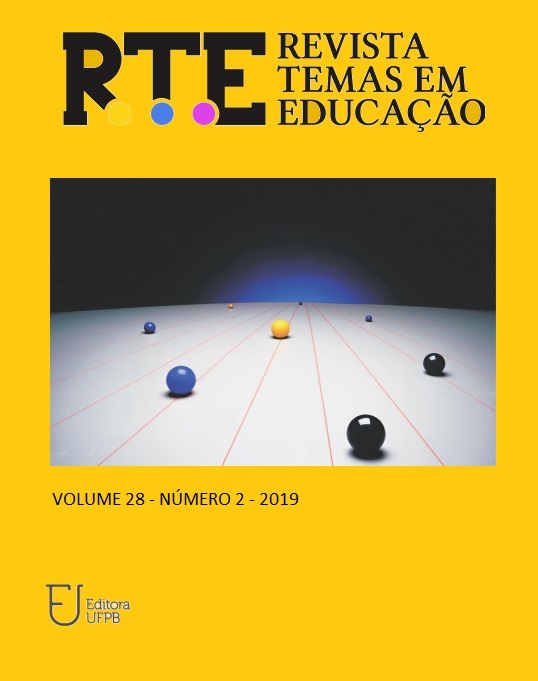PERCEPTIONS OF PROFESSIONALS AND FAMILIES OF CRUCES CHILDREN ON THE WORKDEVELOPED IN CHILDREN EDUCATION
PERCEPTIONS OF PROFESSIONALS AND FAMILIES OF CRUCES CHILDREN ON THE WORKDEVELOPED IN CHILDREN EDUCATION
DOI:
https://doi.org/10.22478/ufpb.2359-7003.2019v28n2.44955Keywords:
Day care, Child education, Take care, To educateAbstract
The controversy over caring and educating has been the background on which the proposals in Child Education are built. In the last decades, the debates emphasize the need for the functions of education and care to be integrated in this stage of education. The present study investigated the meanings that professionals and family of children attributed to the work developed in their institutions of Early Childhood Education. Focal group methodology was used. The analysis considered the speeches of each focal group and sought to identify regularities that indicated agreed meanings but also discrepancies and differences in the groups and between the groups. In general, the statements of family members and professionals were not dissonant and pointed out a positive view of Early Childhood Education and the experiences of children in daycare centers that were associated with their integral development and better performance in their family and school life, however. There are many challenges mentioned, affirming the importance of the existence of institutions of early childhood education with quality educational services. It is intended that this study contribute to the discussion about the role and functions of early childhood educational care, based on the analysis of the speeches of the actors involved, family and professionals.
Downloads
References
AMORIM, Adenice; BRITO, Mônica; BARROS, Siriene. Pare! Respeite-me, também sou cidadão! Revista Criança do Professor de Educação Infantil, Brasília, DF: MEC, n. 39, p. 15-17, abr. 2005.
ANDRADE, Lucimary Bernabé Pedrosa de. Educação Infantil: discurso, legislação e práticas institucionais. São Paulo: Editora Unesp, 2010.
BRASIL. Ministério da Educação. Referencial Curricular para a Educação Infantil. Brasília: MEC/SEF, 1998.
______. Política Nacional de Educação Infantil: pelo direito das crianças de zero a seis anos à Educação. Brasília: MEC, SEB, 2006.
______. Ministério de Educação. Secretaria de Educação Básica. Diretrizes Curriculares Nacionais para a Educação Infantil. Brasília, DF: MEC, 2009.
CAMPOS, Maria Malta. et al. A contribuição da educação infantil de qualidade e seus impactos no início do ensino fundamental. Educação e Pesquisa, São Paulo, v. 37, n. 1, p.15-33, jan./abr. 2011.
CORSINO, Patrícia. (org.). Educação Infantil: cotidiano e políticas. Campinas, SP: Autores Associados, 2012.
KRAMER, Sônia. As crianças de 0 a 6 anos nas políticas educacionais no Brasil: Educação Infantil e/é fundamental. Educação e Sociedade, Campinas, v. 27, n. 96 - Especial, p. 797-818, out. 2006.
______. A política do pré-escolar no Brasil: a arte do disfarce - 9. ed. São Paulo, Cortez Editora, 2011.
______. Formação de profissionais de Educação Infantil: questões e tensões. In: MACHADO, Maria Lúcia de A. Encontros e desencontros em Educação Infantil. 2. ed. São Paulo: Cortez, 2005.
NUNES, M. F. R.; CORSINO, P.; KRAMER, S. (Coord.). Educação Infantil e formação de profissionais no Estado do Rio de Janeiro (1999-2009). Rio de Janeiro: Traço e Cultura, 2011.
KUHLMANN JR., Moisés. Histórias da educação infantil brasileira. Revista Brasileira de Educação, São Paulo, n.14, p. 5-18, mai./ago. 2000.
______. Infância e educação infantil: uma abordagem histórica. Porto Alegre: Mediação, 2011.
MACHADO, Laêda B.; SANTIAGO, Eliete. (Org.). Política e Gestão da Educação Básica. Recife: Ed Universitária UFPE, 2009.
MICARELLO, Hilda Aparecida Linhares da Silva. Formação de profissionais da Educação Infantil: “sair da teoria e entrar na prática?” In KRAMER, Sônia. Profissionais de Educação Infantil: gestão e formação. São Paulo, Ática, 2005.
OLIVEIRA, Zilma de Moraes Ramos. A creche no Brasil: mapeamento de uma trajetória. Revista da Faculdade de Educação, São Paulo, v. 14, n. 1, p. 43-52, jan./jun. 1988.
RECIFE. Resolução nº 14/2004, de 22 de junho de 2004. Estabelece normas para credenciamento das Instituições de Educação Básica, integrantes do Sistema Municipal de Ensino do Recife – SMER pela Secretaria de Educação do Recife. Conselho Municipal de Educação, Recife, PE, 22 jun. 2004.
ROSEMBERG, Fúlvia. Educar e cuidar como funções da educação infantil no Brasil: Perspectiva histórica. São Paulo: Faculdade de Ciências Sociais, Pontifícia Universidade de Campinas, 1999.
______. Organizações multilaterais, estado e políticas de educação infantil. Cadernos de Pesquisa, São Paulo, n. 115, p. 25-63, mar. 2002.
ZANNINI, Célia Cabanelas. Educação Infantil enquanto direito. In: MOVIMENTO INTERFÓRUNS DE EDUCAÇÃO INFANTIL DO BRASIL. Educação infantil: construindo o presente - Movimento Interfóruns de Educação Infantil do Brasil. Campo Grande, MS: UFMS, 2002.
Downloads
Published
How to Cite
Issue
Section
License
Authors who publish in this journal agree to the following terms:
. Authors retain the copyright and grant the journal the right to first publication, with the work simultaneously licensed under the Licença Creative Commons Attribution that allows the sharing of the work with acknowledgment of authorship and initial publication in this magazine. . Authors are authorized to assume additional contracts separately, for non-exclusive distribution of the version of the work published in this journal (eg, publishing in institutional repository or as a book chapter), with acknowledgment of authorship and initial publication in this journal.
. Authors are permitted and encouraged to publish and distribute their work online (eg in institutional repositories or on their personal page) at any point before or during the editorial process, as this can generate productive changes, as well as increase impact and citation of the published work (See O Efeito do Acesso Livre).



















